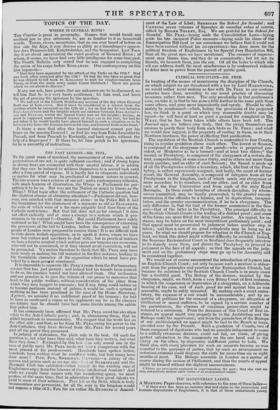THE PAST SESSION—MR. PEEL.
To the great mass of mankind, the management of one idea, and the perpetration of one act, is quite sufficient exertion • and if strong hopes or strong fears are connected with their mental labour, it is seldom that they can be induced to address themselves to a second task until after a long period of repose. It is hardly fair to vituperate individuals or parties for what may be predicated of human nature in general. The late session was a session of one act ; and a contemporary ridicules, with much humour of illustration, the Whigs in Parliament for per- mitting it to be so. But was not the Nation as much to blame as the Whigs? What topic after the settlement of the Catholic question had the slightest chance of obtaining attention ?—Parliament did not, how- ever, rest satisfied with that measure alone : in the Police Bill it laid the foundation for the abatement of a nuisance as old as ELIZABETH, the evils of which were of a far more palpable kind than those of the Catholic restrictions. But that bill does not go far enough ! it does not effect radically and at once a change in a system which it pro- nounces to be corrupt !—Granted. But could Parliament have safely ventured so far? What might have been the consequence of extending the provisions of the bill to London, before the dignitaries and the people of London were prepared to receive them? It is no difficult task to write down foolish opposition, or to speak it down, where we have none but writers and speakers to deal with; but in practical matters we have a host to combat which neither pens nor tongues can overcome, who will not be convinced, or if they cannot avoid conviction, will not be persuaded. We incline therefore to think that Mr. PEEL may have done wisely in making his bill tentative in the first instance, looking to the formidable character of the opposition which he must have pro- yoked by a more general enactment. It is impossible to separate Mr. PEEL'S name from the Parliamentary session that has just passed; and indeed had his friends been content to do so, his enemies would not have allowed them. Our inclination and our practice is to give the tribute of our praise to measures that tend to the public welfare, without consideration of the place from which they may happen to emanate ; but if any thing could induce us to become partizans instead of judges, it would be such a system of mobbing as has been practised in the case of the Home Secretary. A priori, we consider it no indifferent proof of his honesty ; for had he been so confirmed a rogue as his opponents say he is, the chances are infinite that he should have had some friends among the rabble that pelted him.
It has commonly been affirmed that Mr. PEEL owed his elevation solely to the Anti-Catholic party; and, in abandoning them, that he added ingratitude to inconsistency. We suspect that the truth lies on the other side ; and that, so far from Mr. PEEL owing his power to the Anti-Catholics, they have derived from Mr. PEEL for several years past all the power they possessed. In judging of statesmen, the plain rule is the best. Of such the question is, not what have they said, what have they written, but what have they done ? Estimated by this test (the only sound one in the case of public men) Mr. PEEL needs not fear a comparison with the most praised of his predecessors. Hundreds have spoken better, hundreds have written what he could-no! write, but how many have done more ? PITT, Fox, SHERIDAN, CANNING—a galaxy of elo- quence and genius such as no age situ. 1ht of SHAKSPEARE and the Mermaid Club has exhibited—what betietit do the existing race of Englishmen enjoy from the labours of those intellectual Anakim ? And while we couple these names with this humiliating query, we must profess, at the same time, that in admiration of their great talents we yield to hone of their admirers. PITT left us the Debt, which is truly monumentum ere perennius, for all the coin in the kingdom would not remove a tithe of it ; Fox his (or rather Mr.DinsusTING's) Amend- ment of the Law of Libel; SHERIDAN the School for Scandal; and CANNING seven volumes of Speeches de omnibus rebus et ceteris, edited by ROGER THERRY, Esq. We are grateful for the School for Scandal. Mr. PEEL—laying aside the Consolidation Laws—laying aside his late incipient Police measure—laying aside his share of the Emancipation Bill (and in our conscience we believe that it could not have been carried without his co-operation)—has done more for the political freedom of Englishmen by his Special Jury Regulation Bill, than all the great men we have mentioned. The enemies of improve- ment may blame him, and they do so consistently ; but let not its friends, we beseech them, join the cry. Of all the tasks to which idle wit can address itself, the most mischievous is by undeserved ridicule to deter men in power from the pursuit of public good.


















 Previous page
Previous page